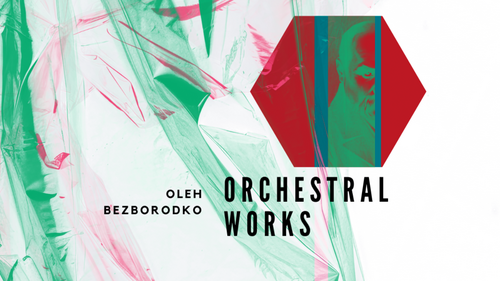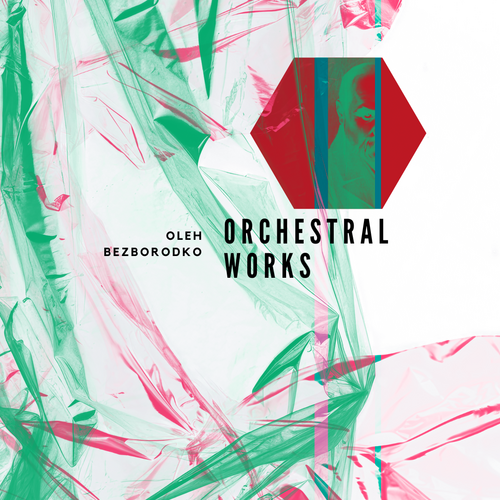Orchestral music stands as one of the vital creative realms for contemporary composer Oleh Bezborodko. The latest release in the Ukrainian Live project showcases three of his orchestral compositions, where fantasy, creativity, eloquence, and emotion converge in selected pieces that have already gained recognition.
"Concerto Grosso ma non molto" for violin, bassoon, and string orchestra (2010) is one of the three concertos for which Oleh Bezborodko received the Mykola Lysenko Prize in 2017. In this recording, the violin part is performed by Orest Smovzh, a renowned Ukrainian violinist of the younger generation and the first performer and inspiration for many of Bezborodko's violin works. The composer wrote "Concerto Grosso ma non molto" at the request of Orest Smovzh. The piece is a rare example of combining a solo violin and bassoon with a string orchestra. Two epigraphs precede the score: "April is the cruellest month..." - the first line from T.S. Eliot's poem "The Waste Land," and a line from Pasternak's poem "Earth" (from the novel "Doctor Zhivago"), which in Ukrainian translates to "And the same mixture of fire and horror, In freedom and in the comforts of home." Bezborodko explains, "Among the multitude of meanings contained in these lines, the most important for me is the sense of a gruesome, cruelly drunken spring that, like a plow, plows and turns over our dormant being after the cozy winter oblivion or, to continue Eliot's quote, 'mixing memory and desire, stirring dull roots with spring rain."
"Path to Kaniv" (2017) is an orchestral version of a chamber work (for violin and piano) composed by Bezborodko in 2014. The composition is dedicated to the 200th anniversary of Taras Shevchenko's birth. However, it was inspired by the tragic events in Ukraine - the Revolution of Dignity and the beginning of russia's armed aggression against Ukraine. Kaniv is a small town in the heart of Ukraine, where Taras Shevchenko, considered the most influential figure in Ukrainian culture, is buried. In the summer of 2014, every Saturday, the composer traveled to this town to spend weekends with his family, resting on summer vacations on the other side of the Dnipro River. This road became a symbol for him of Ukraine's difficult path between war and peace. Remarkably, this music, like the immortal lines of Kobzar, only enriches with relevant meanings over the years.
The original piece "Fanfares and Fugue" (2008) breaks the established patterns of the repertoire for a wind orchestra, typically associated with marches, popular and jazz music, and various orchestral transcriptions. While the fanfares adhere to the established notions of the sound of a wind instrument orchestra, the fugue element in the work proves to be entirely innovative, much like the contemporary musical language and the original composition's form. The piece had a significant impact on the concert project of composer Oleksandr Shchetynskyi and the National Academic Wind Orchestra of Ukraine. The performance by this ensemble is featured in the Ukrainian Live project.
"Concerto Grosso ma non molto" for violin, bassoon, and string orchestra (2010) is one of the three concertos for which Oleh Bezborodko received the Mykola Lysenko Prize in 2017. In this recording, the violin part is performed by Orest Smovzh, a renowned Ukrainian violinist of the younger generation and the first performer and inspiration for many of Bezborodko's violin works. The composer wrote "Concerto Grosso ma non molto" at the request of Orest Smovzh. The piece is a rare example of combining a solo violin and bassoon with a string orchestra. Two epigraphs precede the score: "April is the cruellest month..." - the first line from T.S. Eliot's poem "The Waste Land," and a line from Pasternak's poem "Earth" (from the novel "Doctor Zhivago"), which in Ukrainian translates to "And the same mixture of fire and horror, In freedom and in the comforts of home." Bezborodko explains, "Among the multitude of meanings contained in these lines, the most important for me is the sense of a gruesome, cruelly drunken spring that, like a plow, plows and turns over our dormant being after the cozy winter oblivion or, to continue Eliot's quote, 'mixing memory and desire, stirring dull roots with spring rain."
"Path to Kaniv" (2017) is an orchestral version of a chamber work (for violin and piano) composed by Bezborodko in 2014. The composition is dedicated to the 200th anniversary of Taras Shevchenko's birth. However, it was inspired by the tragic events in Ukraine - the Revolution of Dignity and the beginning of russia's armed aggression against Ukraine. Kaniv is a small town in the heart of Ukraine, where Taras Shevchenko, considered the most influential figure in Ukrainian culture, is buried. In the summer of 2014, every Saturday, the composer traveled to this town to spend weekends with his family, resting on summer vacations on the other side of the Dnipro River. This road became a symbol for him of Ukraine's difficult path between war and peace. Remarkably, this music, like the immortal lines of Kobzar, only enriches with relevant meanings over the years.
The original piece "Fanfares and Fugue" (2008) breaks the established patterns of the repertoire for a wind orchestra, typically associated with marches, popular and jazz music, and various orchestral transcriptions. While the fanfares adhere to the established notions of the sound of a wind instrument orchestra, the fugue element in the work proves to be entirely innovative, much like the contemporary musical language and the original composition's form. The piece had a significant impact on the concert project of composer Oleksandr Shchetynskyi and the National Academic Wind Orchestra of Ukraine. The performance by this ensemble is featured in the Ukrainian Live project.
Text: Victoria Antoshevska
Translated by Taras Demko
Translated by Taras Demko
Listen to music
Слухати музику
Performers:
- Concerto Grosso ma non molto – Orest Smovzh (violin), Mark Kreschenskyi (bassoon), Chamber Orchestra of the National Philharmonic of Ukraine, Vitaliy Protasov (conductor).
- "Path to Kaniv" – Taras Hutsulyak (violin), National Odessa Philharmonic Orchestra, Volodymyr Kozhukhar (conductor).
- Fanfares and Fugue – National Academic Wind Orchestra of Ukraine, Petro Tovstukha (conductor).
- Concerto Grosso ma non molto – Orest Smovzh (violin), Mark Kreschenskyi (bassoon), Chamber Orchestra of the National Philharmonic of Ukraine, Vitaliy Protasov (conductor).
- "Path to Kaniv" – Taras Hutsulyak (violin), National Odessa Philharmonic Orchestra, Volodymyr Kozhukhar (conductor).
- Fanfares and Fugue – National Academic Wind Orchestra of Ukraine, Petro Tovstukha (conductor).
Оркестрові твори
Олег Безбородько
Оркестрова музика – одна з важливих творчих сфер сучасного композитора Олега Безбородька. І новий реліз в проєкті Ukrainian Live представляє одразу три його оркестрові твори. Фантазія, креатив, промовистість та емоційність поєдналися у вибраних композиціях, кожна з яких вже отримала визнання.
“Concerto grosso ma non molto” для скрипки, фагота і струнного оркестру (2010) – один з трьох концертів, за які у 2017 році Олег Безбородько отримав Премію імені Миколи Лисенка. На записі, представленому в релізі, партію скрипки виконує Орест Смовж – відомий український скрипаль молодої ґенерації, першовиконавець і натхненник багатьох скрипкових творів Безбородька. “Concerto grosso ma non molto” композитор так само написав на прохання Ореста Смовжа. Твір є рідкісним прикладом поєднання концертуючих скрипки та фагота зі струнним оркестром. Партитурі передують два епіграфи:
“April is the cruellest month ..." («Квітень – нещадний місяць») — перший рядок поеми Томаса Еліота «The Waste Land» («Безплідна земля») і рядок з вірша “Земля” Бориса Пастернака" (роман «Доктор Живаго»), що в перекладі українською звучить так “І та ж суміш вогню та жаху На волі й в житловому затишку”. Композитор розʼяснює: “Серед безлічі сенсів, які містяться в цих рядках, найважливішим для мене є відчуття моторошної, жорстоко п'янкої весни, яка, наче орало, скородить і перелопачує після затишного зимового забуття наше дрімливе єство або, продовжуючи цитату з Еліота, «змішує пам'ять і бажання, ятрить сонні коріння весняним дощем”.
“Шлях до Канева” (2017) – оркестрова версія камерного твору (для скрипки та фортепіано), який Безбородько написав ще 2014 року. Опус присвячено 200-літтю з дня народження Тараса Шевченка. Проте інспірували його трагічні події в Україні – Революція Гідності та початок збройної агресії росії проти України. Канів – невелике містечко в самому серці України, де поховано Тараса Шевченка, поета, якого вважають найвпливовішою постаттю української культури. Влітку 2014 року щосуботи композитор їздив до цього міста, щоб провести вихідні зі своєю родиною, відпочиваючи на літніх канікулах на іншому березі Дніпра. Ця дорога стала для нього символом важкого шляху України між війною та миром. І дивовижно, що ця музика, як безсмертні рядки Кобзаря, з роками лише збагачується актуальними для сенсами.
Оригінальний твір “Фанфари та фуга” (2008) розриває сталі шаблони про репертуар духового оркестру, який асоціюється у слухачів з маршами, популярною та джазовою музикою та різноманітними оркестровими перекладеннями. І якщо фанфари відповідають сталим уявленням про звучання оркестру духових інструментів, то елемент фуги у творі виявляється цілком новаторським, так само як сучасна музична мова та оригінальна форма композиції. Свого часу твір органічно вплівся у концертний проект композитора Олександра Щетинського та Національного академічного духового оркестру України. І саме виконання цього колективу представлено у проєкті Ukrainian Live.
“Concerto grosso ma non molto” для скрипки, фагота і струнного оркестру (2010) – один з трьох концертів, за які у 2017 році Олег Безбородько отримав Премію імені Миколи Лисенка. На записі, представленому в релізі, партію скрипки виконує Орест Смовж – відомий український скрипаль молодої ґенерації, першовиконавець і натхненник багатьох скрипкових творів Безбородька. “Concerto grosso ma non molto” композитор так само написав на прохання Ореста Смовжа. Твір є рідкісним прикладом поєднання концертуючих скрипки та фагота зі струнним оркестром. Партитурі передують два епіграфи:
“April is the cruellest month ..." («Квітень – нещадний місяць») — перший рядок поеми Томаса Еліота «The Waste Land» («Безплідна земля») і рядок з вірша “Земля” Бориса Пастернака" (роман «Доктор Живаго»), що в перекладі українською звучить так “І та ж суміш вогню та жаху На волі й в житловому затишку”. Композитор розʼяснює: “Серед безлічі сенсів, які містяться в цих рядках, найважливішим для мене є відчуття моторошної, жорстоко п'янкої весни, яка, наче орало, скородить і перелопачує після затишного зимового забуття наше дрімливе єство або, продовжуючи цитату з Еліота, «змішує пам'ять і бажання, ятрить сонні коріння весняним дощем”.
“Шлях до Канева” (2017) – оркестрова версія камерного твору (для скрипки та фортепіано), який Безбородько написав ще 2014 року. Опус присвячено 200-літтю з дня народження Тараса Шевченка. Проте інспірували його трагічні події в Україні – Революція Гідності та початок збройної агресії росії проти України. Канів – невелике містечко в самому серці України, де поховано Тараса Шевченка, поета, якого вважають найвпливовішою постаттю української культури. Влітку 2014 року щосуботи композитор їздив до цього міста, щоб провести вихідні зі своєю родиною, відпочиваючи на літніх канікулах на іншому березі Дніпра. Ця дорога стала для нього символом важкого шляху України між війною та миром. І дивовижно, що ця музика, як безсмертні рядки Кобзаря, з роками лише збагачується актуальними для сенсами.
Оригінальний твір “Фанфари та фуга” (2008) розриває сталі шаблони про репертуар духового оркестру, який асоціюється у слухачів з маршами, популярною та джазовою музикою та різноманітними оркестровими перекладеннями. І якщо фанфари відповідають сталим уявленням про звучання оркестру духових інструментів, то елемент фуги у творі виявляється цілком новаторським, так само як сучасна музична мова та оригінальна форма композиції. Свого часу твір органічно вплівся у концертний проект композитора Олександра Щетинського та Національного академічного духового оркестру України. І саме виконання цього колективу представлено у проєкті Ukrainian Live.
Виконавці:
Concerto grosso ma non molto – Орест Смовж (скрипка), Марк Крещенський (фагот), Камерний оркестр Національної філармонії України, Віталій Протасов (дириґент).
“Шлях до Канева” – Тарас Гуцуляк (скрипка), Національний Одеський філармонійний оркестр, Володимир Кожухар (дириґент).
Фанфари та фуга – Національний академічний духовий оркестр України, Петро Товстуха (дириґент)
Concerto grosso ma non molto – Орест Смовж (скрипка), Марк Крещенський (фагот), Камерний оркестр Національної філармонії України, Віталій Протасов (дириґент).
“Шлях до Канева” – Тарас Гуцуляк (скрипка), Національний Одеський філармонійний оркестр, Володимир Кожухар (дириґент).
Фанфари та фуга – Національний академічний духовий оркестр України, Петро Товстуха (дириґент)
Текст: Вікторія Антошевська


